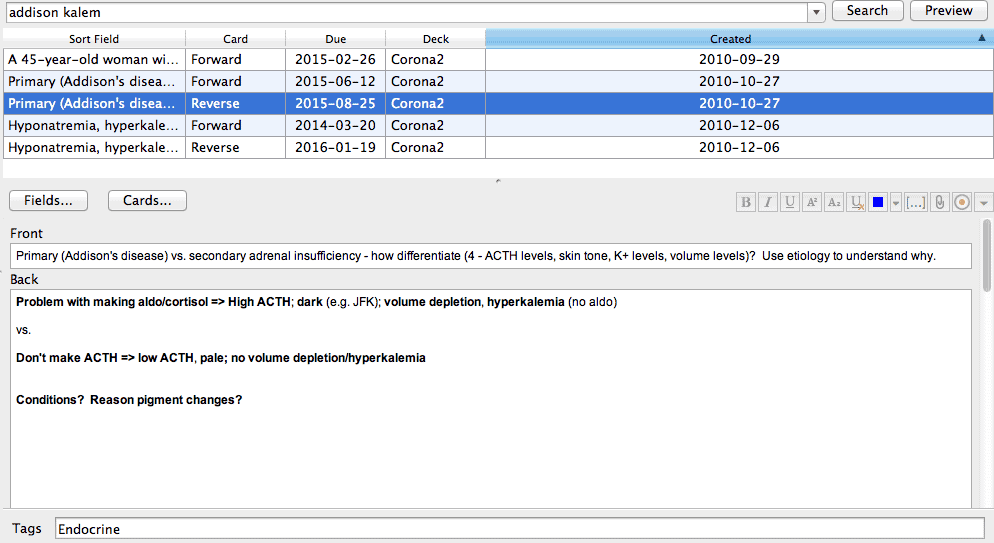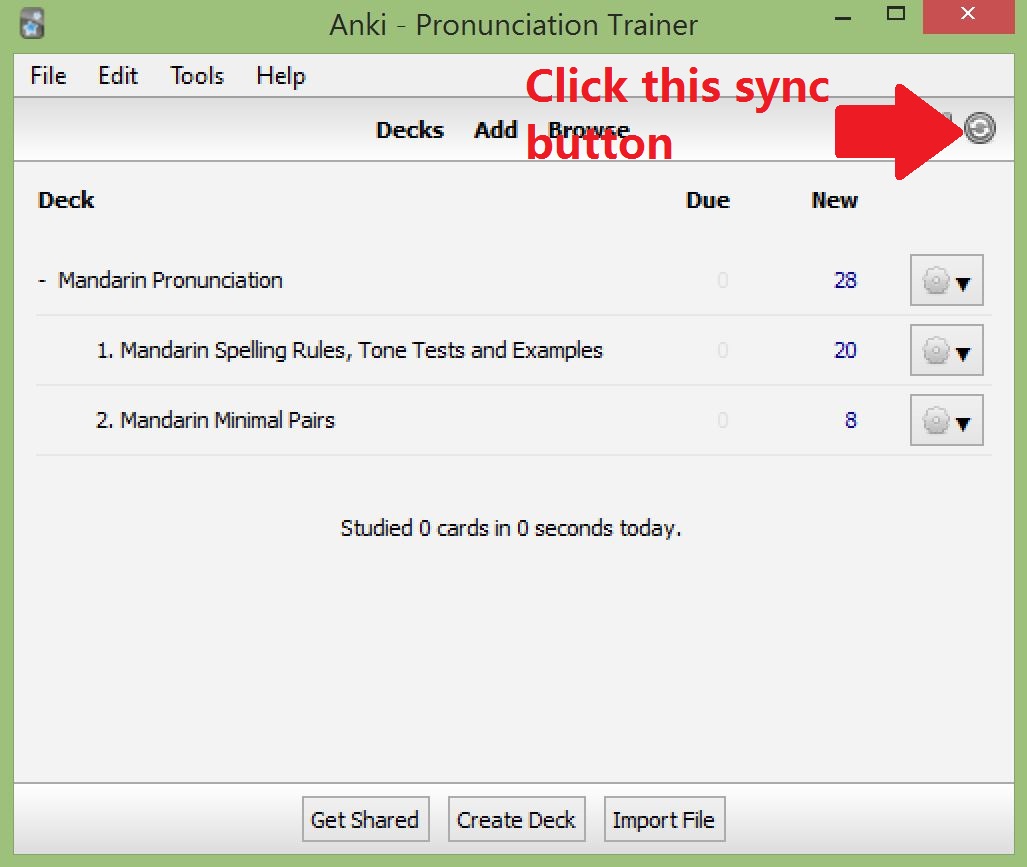
Sep 01, 2010 Anki Flashcards for the USMLE Step 1. Discussion in 'Step I' started by IMGUSMLEStep1, Sep 1, 2010. There are already some USMLE step 1 anki flashcards out there that you can download. I used some of these.
Jadi kamu tidak perlu khawatir dengan kualitas game memasak yang kamu download. Download game gratis untuk pc.

Anki decks for sharing
Hey guys, I'm getting ready to take my Step 1 in the next two weeks- good luck to everyone who is preparing! I'm an anki fiend and got started preparing for this test early last year so I have a ton of anki resources I made. It seems a shame to let all that hard work go to waste so I'm happy to share if anyone would find them useful. PM me if so!
I have made the following:
An image occluded deck of all of Sketchy (Pharm, Micro, the Path that's out so far). I found this super useful! I love sketchy but the pharm videos were just too long and not working for me until I made flashcards out of the sketches. Now pharm is like my best subject!
Pathoma: I literally just turned the pathoma book into flashcards. I did the flashcards, watched the videos, did flashcards again. Honestly I'm not one of those people who love pathoma and these cards are literally just the book in flashcard format- I don't really retain well from just reading- but they're not super targeted and tend to have a lot of text on them.
My private First Aid/UWorld deck- I first made flash cards from first aid/the USMLE-RX q bank, took notes from UWorld directly into Anki and then I tagged the ones that were mentioned/included info in UWorld. Basically I supplemented First Aid with all the info from UWorld. I also took some info that I thought was good from the Kaplan Q bank but I didn't obsess about it because I am not that obsessive. Although I'm clearly a little obsessive, lol.
A visual review deck! I found I was getting intimidated by image questions so I made a deck that consists of 1) images from FA 2) An equivalent to every image in UWorld 3) Any other images I encountered along the way. This really really helped me out with histology as well as micro, and for pathology that has visually distinct presentations. I also found that this helped the problem of just knowing 'buzzwords' and then not recognizing stuff based on the description in the question stem. Like for example if the question doesn't actually say 'signet-ring' but instead says 'cells with abnormal production of mucin and a displaced nucleus'. I also included radiographic findings because I suck at that. Probably 1000 (edit: actually about 650) images all together. Less for pure memorization and more for the 'hey, I've seen this before!' feeling.
Also if you're an anki nerd, I recommend Yousmle's deck. He sells it and it's not cheap. Frankly I didn't think it was helpful for learning new material or refreshing stuff I'd totally forgotten, so I neglected to use it until late in my study period. But if you've got a good handle on a subject it is really good at highlighting important bits of info and presenting them in a super relevant way.
edit: to everyone who is messaging: sorry if I haven't responded yet!! In retrospect I should've posted this AFTER my step. Download file now send rfu upgrade on usb dev port. rest assured I will get back to you and send these out- I'm just a little stressed at the moment lol. If you message me and don't hear from me, give me a week and I'll be back!!! Edit: UPDATE: Sketchy + Pathoma + Visual review have been sent out. It takes me forever to upload the files because they are gigantic. My FA/UWorld deck turns out to be more than 10k cards (lol) and it is at this point a random jumble of material from all over the place. After step I'll worry about posting that one. If you messaged me for any of these and didn't get a response message me again! OP delivers!
EDIT: Can I just say how funny it is that this now has 116 comments and 20 upvotes. lol. oh reddit.
Anki can be one of the most amazing programs for medical school and the USMLEs. It has single-handedly changed my approach to medicine, and is one of the key factors for me scoring 270 on the USMLE Step 1. However, it can also be overwhelming, and even detrimental to the point of taking away time from doing other, more important things. So what can we do to make sure that we use Anki for its good aspects, but prevent ourselves from being overwhelmed? How can we turn spaced repetition into a tool for good, without being buried under a deluge of flashcards?
Here is a question that I got recently from a student, which could have been from dozens of other students that I’ve heard from, or worked with personally, who struggle with feeling trapped under a mountain of Anki flashcards.
Hey Alec, I have been closely following your website as I prepare for Step 1. Over the last few months, I have accumulated a few thousand Anki cards on a small number of topics (i.e. my reproductive deck alone contains 400 cards), and I am feeling overwhelmed. I was wondering if you could offer advice on how to keep up with numerous decks at once. How many cards approximately should I have in each deck? Should I just be making cards for key topics? And how many cards did you do each day? Specific advice would be greatly appreciated!
I, too, have felt overwhelmed by the number of cards to review. During my second year of medical school, I was doing upwards of 350 to 400 old cards a day, with roughly 45 new cards I was adding to my reviews daily. That may seem like a lot, and it certainly did at the time, but I’ve heard from students who are doing more than 1000 cards in a day, and are feeling burned out and unable to keep up with their current block, let alone all of their old cards from previous blocks.
Here I share 5 tips I’ve picked up to make spaced repetition work for you. If you haven’t had a chance, you can read my previous tutorials on how to make Anki cards, more advanced Anki tips, as well as other frequently asked questions.
1. Make pathogenesis presentation cards to improve retention and reduce the number of cards you make
You’ve probably noticed that the better you know something, the fewer words it takes to describe it. Cosmo pyke just cosmo download youtube. The same applies to making Anki cards; the more connections you can make, the fewer cards you end up making. On the flip side, the worse you know a particular subject, and the less depth and integration you have, the more cards it will take to understand it.
Let’s take for example subdural and epidural hematomas. The vast majority of students on forums and other places you will see online simply go to First Aid, and make simple flashcard-type memorization cards on things like pathogenesis, presentation, time course and whether they will cross the falx cerebri or not. To do this effectively, however, you would have to make separate cards for each of these things, so as to not put too much information on any given card. For this topic alone, you can easily generate eight cards, forward and reverse for pathogenesis, presentation, time course, as well as radiographic appearance.
Instead, if you can connect the various facts together, you can dramatically reduce the number of cards that you make. For example, in this card that I created for a student several years ago, you can see that I connected, but because I was able to integrate all of the information together, I only had to make two cards instead of the 8 they had been trying to make.
For this one example, I was able to reduce the number of cards I had to make by 75%! Just think if you are able to do this for all of the topics in First Aid, how many fewer cards you would have to make, and how much better you would know the information for your test!
Granted, this is much easier said than done. One of the biggest reasons why I created the Yousmle.com Anki decks is that I was getting emails virtually every day from students asking for my cards, and for help with making pathogenesis to presentation cards. You can get samples of the cards that I made here, as well as links to the decks I have put together of some of my best pathogenesis to presentation cards, so that you can use them as templates for your own streamlined cards, and save time on looking up all of the information yourself. If you haven’t already, make sure you sign up for the Yousmle newsletter, and get a free micro starter deck!
2. Use First Aid to target the most important information

One of the things I struggled with most as a medical student was figuring out what was important to know. Professors would rarely point out the most important or high-yield facts, and so I was left to my own devices to figure out what was most important. Typically, I would guess wrong, and find out only after weeks/months of studying that a particular point emphasized by my professor wasn’t very important, but something else they might have breezed past was emphasized heavily on my exams.
To avoid this mistake, make sure that you target the material in First Aid as your priority for things to learn, supplementing it with lecture material, Goljan pathology, Costanzo physiology, or other top resources.
To learn more about my approach to First Aid, read my article here on the top mistake that students make.
Grow Empire: Rome is a captivating game, mixing tower defense (TD) and strategy mechanisms with role playing (RPG) elements.You are Caesar, mighty. Popular alternative Games to Grow Empire: Rome for Android, Android tablet and more. Download top 48 Games like Grow Empire: Rome, all Games suggested. Jul 25, 2017 - Download Guide Grow Empire rome 2 apk 5.2 for Android. Playing so this guide app for grow empire games is not a game it's just a guide. Emoji Keyboard - Colorful themes, Hot Stickers, Gree Gifs Emoji for everyone! Similar to Grow Empire: Rome. Toy Defense 2. Melsoft Games. Download Grow Empire: Rome apk 1.3.81 for Android. Grow Empire: Rome is a captivating game, mixing tower defense (TD) and strategy mechanics with role. Download game grow empire apk pure 1.
3. Take advantage of downtime to do reviews
Everyone in medicine complains about not having enough time in the day. I thought medical students had it bad, but I can tell you as a resident, finding time in your day for reading or studying does not get any easier.
The beauty of Anki is that with the power of the Anki mobile app, you can study on the go. For example, some of my best studying is done at the gym, where unencumbered by Internet access and the myriad distractions it brings, I can focus all of my attention on completing my Anki cards, either on the treadmill or stationary bike. On clerkships, I utilized chunks of downtime to make sure that I had finished all of my cards by the time I’d gotten home, giving me relatively peaceful and free evenings to do whatever I wanted. Even waiting in line at the grocery store can yield a surprising number of cards reviewed.
If you add up all of the 5, 10, or 15 minute chunks of time that you have throughout the day, you would be surprised how many cards you can finish without dedicating a specific amount of time to doing cards.
4. Set a limit on the number of cards you make in a day
Whenever students talk about how many cards they have to review, I always remind them that it’s a simple numbers game: the more cards you make, the more cards you will have to review. If you are adding 50 new cards to your deck every day, the next day you will have 50 old cards to review, as well as 50 new cards. Then, roughly 4 days after that, when the 50 cards from your first day of review that had a four day time interval are due, you will have the 50 + 50 = 100 old cards to review, as well as the 50 new cards you have been adding each day. This will continue until those first cards reach their next interval, giving you 150 reviews, and so on.
It’s a simple numbers game: the more cards you make, the more cards you will have to review.
The only way to change this is to reduce the number of new cards you make. Sometimes, you simply have to set a limit on the cards you create, which has the benefit of both focusing your attention on the most important facts, as well as helping you to feel less overwhelmed. This brings me to my final point, which is:
5. Give yourself permission to not remember everything
Most medical students I have ever met have been very hard workers. You need an incredible work ethic (coupled with a dose of masochism) to persevere through the endless years of schooling and training. While generally this is a wonderful trait, it has driven more than a few students to insanity, as well as to fail to use spaced repetition to its full potential.
My goal when I started using Anki wasn’t to learn everything. It quickly became obvious to me that while spaced repetition was amazing, it could easily be my undoing if I tried to make too many cards. As such, I started with much more modest goals for myself. I told myself if I knew roughly 30 to 40% of the information from lecture, but knew it exceedingly well, as well as most of the information in First Aid, I would do just fine.
Just remember your final exams. So much of the information that we slaved over ended up not being on our test. At most, maybe 30 or 40% of all of the material presented, if even that, ends up on the final exam. The USMLE Step 1 is very similar, in that the vast majority of questions will not be nearly as detailed as what you learned originally.
Remember: you don’t have to remember every single word on every single slide, or every word from your lectures, in order to reach your goals.
Final thoughts
At the end of the day, it’s important to remember that perfect is the enemy of good. Don’t spend too much time on perfection, trying to make the world’s best pathogenesis presentation card, just like you shouldn’t try to have perfect understanding and knowledge of every single lecture. You will only drive yourself crazy.
Usmle Step 1 Registration
And if you’re looking for a boost, you can check out see ever growing Step 1 and 2 decks, which I update on a regular basis, which contain some of my best pathogenesis to presentation cards.